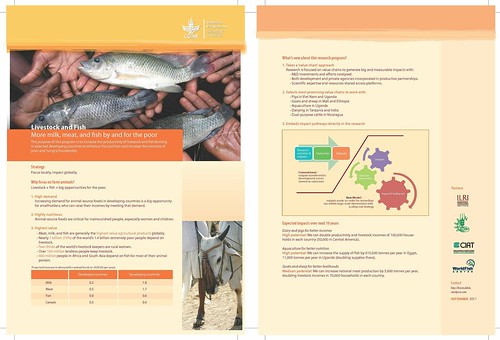Among flyers of the CGIAR Research Programs displayed at the G20 meeting on ‘Agriculture Research for Development: Promoting Scientific Partnerships for Food Security,’ in Montpellier, France, 12-13 Sep 2011, was this one on ‘Livestock and Fish: More Meat, Milk and Fish by and for the Poor’ (brochure by ILRI [content] and CIP [design] for the CGIAR Consortium).
On 16 Sep 2011, the chairman of the board of the CGIAR Consortium for International Agricultural Research, Carlos Pérez del Castillo, made the following statements, which are excerpted from a message he sent to the directors general of the 15 CGIAR centres, including the International Livestock Research Institute (ILRI), which leads the CGIAR Research Program on Livestock and Fish: More Meat, Milk and Fish by and for the Poor.
‘The G20 Conference on Agricultural Research for Development just held in Montpellier (12–13 September 2011), was the first conference in the history of the G20 that focused on issues of international agricultural research for development. David Nabarro called it a “historic event of momentous proportions”, because of the strong consensus that emerged from the discussions on the key role of international agricultural research for development in providing sustainable long-term solutions to global food security.
‘Participants comprised the G20 representatives of Agriculture, Research and Foreign Affairs Ministries, as well as the Directors General of G20 Agricultural Research institutions. Key international institutions participated as well: GFAR [Global Forum on Agricultural Research], FAO [United Nations Food and Agriculture Organization], the World Bank and the CGIAR Consortium. . . .
‘With the objective to promote international scientific partnerships for Food Security, this was a working meeting with four sessions. The first, on how to increase coordination of agricultural research systems in the G20 countries was chaired by Japan and the CGIAR gave a keynote presentation . . . .
It was heartening to hear many delegations state that existing coordination mechanisms, such as the CGIAR Research Programs and the GCARD Roadmap, are particularly well positioned to facilitate international coordination . . . .
‘[T]hroughout the Conference, extensive references were made to a strong commitment to international agriculture research for development and to the important role that the reformed CGIAR is expected to play in the international arena, as facilitator of research synergies among G20 countries. . . . There was . . . an overwhelming consensus that more stable and longer-term funding are needed for international agricultural research to succeed in providing long-term options and solutions to global food security. . . .
‘We expect that the salient points from this meeting will be used as input for the joint G20 ministerial Finance and Development meeting in Washington (September 25), and for the Heads of States Summit, in Cannes (November 3–4). . . .
‘[A]t the end of the Conference, the Treaty establishing the CGIAR as an international organization was signed by France . . . and by Hungary . . . . Two other countries are expected to sign in the coming days, as the Treaty is now formally open for signatures at the Ministry of Foreign Affairs in Paris.’
View the poster on the CGIAR Research Program on Livestock and Fish.


Pingback: G20: New Focus on Agricultural Research | LRD Economics